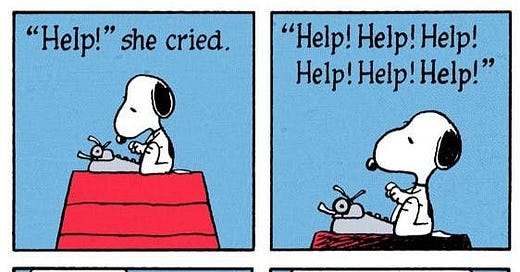Good morning, writers!
What's in a word count?
So, I’ve been working on my plan for NaNoWriMo. I don’t always do NaNoWriMo, not anymore, but I’ve decided to do it this year. And one thing I do differently these days is plan ahead for success. Which has me thinking about word count.
I like entering my word count into the NaNoWriMo website. It makes me feel good, like I've accomplished something. It's motivating. But I don't normally have a daily word count goal in my everyday writing life. Or even a page goal. Which got me thinking: if meeting a daily word count goal and tracking it motivates me, maybe I should trade in my "write every morning for as long as I can" routine for a daily word count goal.
So, I started researching the practice of setting daily word count goals. First, I wanted to find out whether this is something career writers do. Some do, and some don't, is what I learned. And even those who do vary wildly in how many words they write per day.
Tom Wolfe only wrote an average of 135 words per day, but he still finished books like The Bonfire of the Vanities and The Right Stuff. Ian McEwan shoots for a minimum of 600 words a day. Stephen King and Nicholas Sparks have daily word count goals of 2,000 words, and Anne Rice's daily word count goal was 3,000. Michael Crichton wrote an average of 10,000 words a day!
But most writers on the list clocked in at about 1,000-1,500 words—I suspected as much, and this was the deciding factor in my decision to do NaNoWriMo. I should be writing around 1,667 words a day anyway, I told myself.
"There are three rules for writing a novel. Unfortunately, no one knows what they are."
—W. Somerset Maugham
What was interesting to me, too, is the varied number of hours it took for writers to achieve their daily word counts. It took Mark Twain four or five hours to write 1,400 words. It takes Nicholas Sparks five or six hours to write 2,000 words. It took Ernest Hemingway about six hours to write 500 words. It takes Sebastian Faulks a full eight-hour workday to write 1,000 words. Stephen King used to hit his 10-page, 2,000-word goal by 11:30 a.m., but he finds it's taking until 1:30 p.m. most days as he gets older, sometimes longer. Patricia Highsmith, bless her, writes 2,000 words in four or five hours, seven days a week. Sophie Kinsella writes 1,000 words a day, sometimes by 11 a.m. She gives up if she's still struggling to get there by 3 p.m.
And not all writers use a daily word count goal: Kate DiCamillo's goal is to write two pages a day, five days a week, which averages about 600-900 words a day.
"If you can write each day, do it, and meet a quota. Minimum 350 words a day. A baboon can do 350 words a day. Don't be shown up by a baboon."
—James Scott Bell
What are the benefits of setting a daily word count goal, I wondered, as opposed to writing willy nilly for several hours?
Some writers say that having a countable way to measure their progress motivates them. Some feel a sense of accomplishment when they enter their daily word count into a spreadsheet. Some believe setting a relatively low daily word count goal, like 500 words, leaves no room for excuses. Others believe setting a low daily word count goal and then gradually increasing it will help them build up stamina and become a more prolific writer. Still others find daily word count goals stifle their creativity—they prefer to go where the writing takes them.
What's the verdict, then?
What was my takeaway from all this research about daily word counts? It drove home to me how individual a process writing is. There is no right answer. The answer will be different for each of us. Some of us write more quickly, and for some of us it takes longer. Writers generally know what works best for them and what keeps them motivated. My routine in the past has been to get up early and write for as long as I can until I'm either exhausted or have to report for my other work duties.
Next year, I think I'm going to set a page-count or word-count goal for my daily writing. I think, knowing my personality as I do, having a more concrete goal each morning will motivate me. But something else factors in, too, which I didn't hear from any of the other writers I read about, but which I'll admit to you: I like to have a finish line in sight. I can do pretty much anything in short bursts, as long as I can see the finish line.
Wishing you a joyful day filled with wonder, warmth, and words. And then, perhaps, just one more word.
Leanne




